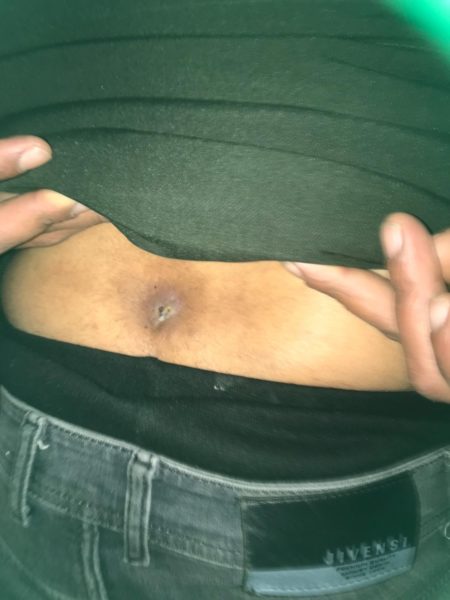The respondent is a 35-year-old man from Tunisia who was pushed back five times from North Macedonia to Greece. This report details the fifth and most recent time he was pushed back, which took place on 25 March 2022.
Around 10 PM, the respondent and his two transit group members, who are from Morocco, were reportedly apprehended in the town of Gevgelija. It is unclear when and where they crossed the border to North Macedonia. The group encountered what the respondent believed to be five North Macedonian police officers, three men and two women who arrived in a car. He remembered seeing the North Macedonian flag on their uniforms. According to the respondent, the officers recognised him “because he tried already five times”, and told the transit group to get into the vehicle.
The officers took the transit group to a ‘camp’ that seemed to be close to the point of apprehension because they drove a very short distance to the camp; “500 metres or something”. Inside the ‘camp’ there were 20 or 25 containers which contained toilets and showers. According to the respondent, there were around 100 people inside the camp and only families. Based on the descriptions of the camp and the driving distance, it is probable that the ‘camp’ the transit group was brought to is the Vinojug Temporary Transit Centre, which was mentioned in BVMN’s February 2022 Monthly Report and seems to be a common place people-on-the-move are taken to before they are pushed back to Greece from North Macedonia.
At the ‘camp’, the respondent was asked for his personal information which included his name and nationality, in addition to his fingerprints. He was provided something to drink and was allowed to go to the bathroom. Reportedly, he was at the ‘camp’ for around 2 to 3 hours. In addition, he talked to “employees of the camp” who were reportedly wearing a uniform with the logo of the European Union. He expressed to them that he wanted to apply for asylum, to which they replied:
“No, in Macedonia you can’t do it [claim asylum]” and “If you would have a family, it wouldn’t be a problem, but as you are alone, you cannot do it”.
Around midnight, three “NATO officers”, two Croatian men and one Czech woman, reportedly arrived at the ‘camp’ in an unmarked red Mercedes van with a Czech licence plate. The respondent could tell the officers’ nationalities from their uniforms because “it was written on the sign on the arm; the name and country”. The officers were wearing balaclavas, black jeans, a “massive” green jacket, and “really heavy shoes, black shoes”. ‘NATO’ is a term commonly used by people-on-the-move to refer to Frontex officers. However, in the absence of other descriptors (e.g. Frontex insignia, blue armbands) it is difficult to state with certainty that Frontex officers were involved. However, the presence of Czech officers during pushbacks from North Macedonia, has been reported before by people-on-the-move in several testimonies (here, here, and here).
The respondent plus his two group members were put in the car together with the three “NATO” officers. Reportedly, after leaving the camp and driving for an hour, the car stopped around 1 AM in a town that the respondent did not remember the name of. Here, they stopped and waited for a different car to arrive. The respondent explained how the second car contained 20 men from Afghanistan who were then transferred to the red van he and his group members were in.
According to the respondent, after they had picked up the additional 20 people, they drove back to Gevgelija where they were pushed back to Greece around 3 or 4 AM. The respondent estimated to have driven between 2 to 3 hours in total, including the drive to the unidentified town where they picked up 20 people and the drive back to Gevgelija from where they were reportedly pushed back. The exact location of where the pushback happened is unclear.
When the transit group arrived at the Greek-Macedonian border, the respondent explained that the three officers handcuffed everyone and they were told to kneel on the ground, later they were forced to “kneel more, with the head on the ground”. Then for the duration of 20 minutes, the officers reportedly beat every member of the transit group while they were kneeling on the ground. All three officers were involved in the beating and used batons to hit everyone “everywhere, also the head and the arms”. The respondent recalled he was beaten on his head and neck.
“The woman told him, ‘don’t look me in the eyes, look down’, and then beat him and the others.”
After 20 minutes, the officer removed everyone’s handcuffs and told them to “go, go” and urged them to run across the border to Greece. When the officers removed the respondent’s handcuffs, they reportedly kicked him on his back as a sign for him “to run, to go fast” and told him “if you come back, we will beat you again”. The respondent explained that they ran for 5 or 10 minutes, during which he and his original transit group got separated from the other 20 people.
One of the respondent’s group members had some money that they intended to use to take a taxi. However, when they tried to take one, the driver reportedly told them “if you don’t have documents, I won’t take you further” and “if you have money, I don’t care, I won’t take you”. After this, they travelled by foot for three days until they arrived in Polykastro.

Image of the respondent’s injury after he was kicked on his back by one of the officers just before being pushed back to Greece from North Macedonia
